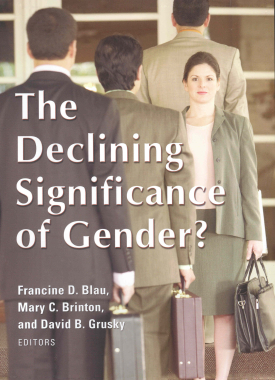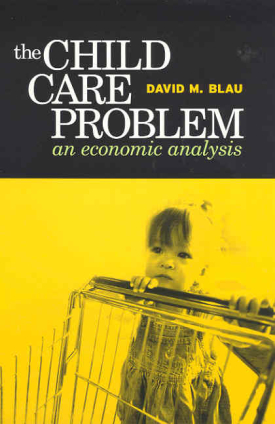
The Declining Significance of Gender?
About This Book
The last half-century has witnessed substantial change in the opportunities and rewards available to men and women in the workplace. While the gender pay gap narrowed and female labor force participation rose dramatically in recent decades, some dimensions of gender inequality—most notably the division of labor in the family—have been more resistant to change, or have changed more slowly in recent years than in the past. These trends suggest that one of two possible futures could lie ahead: an optimistic scenario in which gender inequalities continue to erode, or a pessimistic scenario where contemporary institutional arrangements persevere and the gender revolution stalls.
In The Declining Significance of Gender?, editors Francine Blau, Mary Brinton, and David Grusky bring together top gender scholars in sociology and economics to make sense of the recent changes in gender inequality, and to judge whether the optimistic or pessimistic view better depicts the prospects and bottlenecks that lie ahead. It examines the economic, organizational, political, and cultural forces that have changed the status of women and men in the labor market. The contributors examine the economic assumption that discrimination in hiring is economically inefficient and will be weeded out eventually by market competition. They explore the effect that family-family organizational policies have had in drawing women into the workplace and giving them even footing in the organizational hierarchy. Several chapters ask whether political interventions might reduce or increase gender inequality, and others discuss whether a social ethos favoring egalitarianism is working to overcome generations of discriminatory treatment against women.
Although there is much rhetoric about the future of gender inequality, The Declining Significance of Gender? provides a sustained attempt to consider analytically the forces that are shaping the gender revolution. Its wide-ranging analysis of contemporary gender disparities will stimulate readers to think more deeply and in new ways about the extent to which gender remains a major fault line of inequality.
FRANCINE D. BLAU is Frances Perkins Professor of Industrial and Labor Relations and Labor Economics at Cornell University.
MARY C. BRINTON is Reischauer Institute Professor of Sociology at Harvard University.
DAVID B. GRUSKY is professor of sociology at Stanford University.
CONTRIBUTORS: Francine D. Blau, Mary C. Brinton, Paula England, Claudia Goldin, David B. Grusky, Heidi Hartmann, Robert Max Jackson, Lawrence M. Kahn, Vicky Lovell, Eva M. Meyersson Milgrom, Trond Petersen, Solomon W. Polachek, Cecilia L. Ridgeway, and Stephen J. Rose.
Related Events & Media
RSF Journal
View Book Series
Sign Up For Our Mailing List
Apply For Funding

The Child Care Problem
About This Book
The child care system in the United States is widely criticized, yet the underlying structural problems are difficult to pin down. In The Child Care Problem, David M. Blau sets aside the often emotional terms of the debate and applies a rigorous economic analysis to the state of the child care system in this country, arriving at a surprising diagnosis of the root of the problem.
Blau approaches child care as a service that is bought and sold in markets, addressing such questions as: What kinds of child care are available? Is good care really hard to find? How do costs affect the services families choose? Why are child care workers underpaid relative to other professions? He finds that the child care market functions much better than is commonly believed. The supply of providers has kept pace with the number of mothers entering the workforce, and costs remain relatively modest. Yet most families place a relatively low value on high-quality child care, and are unwilling to pay more for better care. Blau sees this lack of demand—rather than the market's inadequate supply—as the cause of the nation's child care dilemma. The Child Care Problem also faults government welfare policies—which treat child care subsidies mainly as a means to increase employment of mothers, but set no standards regarding the quality of child care their subsidies can purchase.
Blau trains an economic lens on research by child psychologists, evaluating the evidence that the day care environment has a genuine impact on early development. The failure of families and government to place a priority on improving such critical conditions for their children provides a compelling reason to advocate change. The Child Care Problem concludes with a balanced proposal for reform. Blau outlines a systematic effort to provide families of all incomes with the information they need to make more prudent decisions. And he suggests specific revisions to welfare policy, including both an allowance to defray the expenses of families with children, and a child care voucher that is worth more when used for higher quality care.
The Child Care Problem provides a straightforward evaluation of the many contradictory claims about the problems with child care, and lays out a reasoned blueprint for reform which will help guide both social scientists and non-academics alike toward improving the quality of child care in this country.
DAVID M. BLAU is professor economics at the University of North Carolina, Chapel Hill.
RSF Journal
View Book Series
Sign Up For Our Mailing List
Apply For Funding

At Home and Abroad
About This Book
Winner of the 2002 Richard A. Lester Prize for Outstanding Book in Labor Economics and Industrial Relations
Throughout the latter part of the 20th century, the U.S. labor market performed differently than the labor markets of the world's other advanced industrialized societies. In the early 1970s, the United States had higher unemployment rates than its Western European counterparts. But after two oil crises, rapid technological change, and globalization rocked the world's economies, unemployment fell in the United States, while increasing dramatically in other nations. At the same time, wage inequality widened more in the United States than in Europe. In At Home and Abroad, Cornell University economists Francine D. Blau and Lawrence M. Kahn examine the reasons for these striking dissimilarities between the United States and its economic allies.
Comparing countries, the authors find that governments and unions play a far greater role in the labor market in Europe than they do in the United States. It is much more difficult to lay off workers in Europe than in the United States, unemployment insurance is more generous in Europe, and many fewer Americans than Europeans are covered by collective bargaining agreements. Interventionist labor market institutions in Europe compress wages, thus contributing to the lower levels of wage inequality in the European Union than in the United States.
Using a unique blend of microeconomic and microeconomic analyses, the authors assess how these differences affect wage and unemployment levels. In a lucid narrative, they present ample evidence that, as upheavals shook the global economy, the flexible U.S. market let wages adjust so that jobs could be maintained, while more rigid European economies maintained wages at the cost of losing jobs.
By helping readers understand the relationship between different economic responses and outcomes, At Home and Abroad makes an invaluable contribution to the continuing debate about the role institutions can and should play in creating jobs and maintaining living standards.
FRANCINE D. BLAU is Frances Perkins Professor of Industrial and Labor Relations, and LAWRENCE M. KAHN is Professor of Labor Economics and Collective Bargaining, School of Industrial and Labor Relations, Cornell University.
